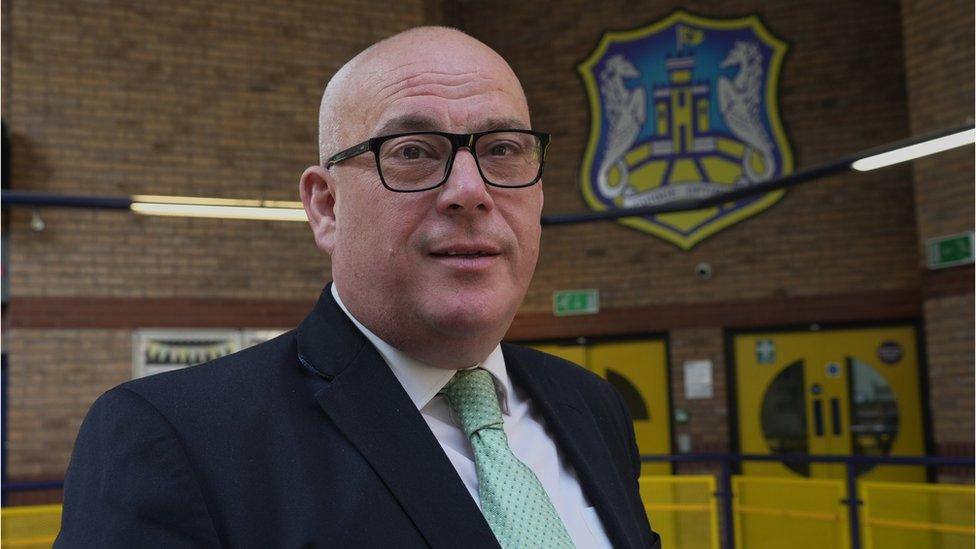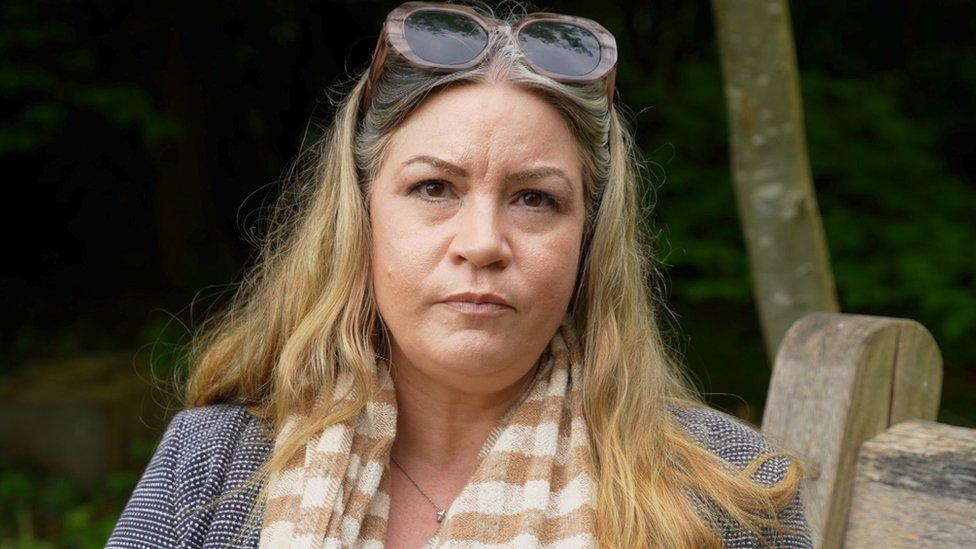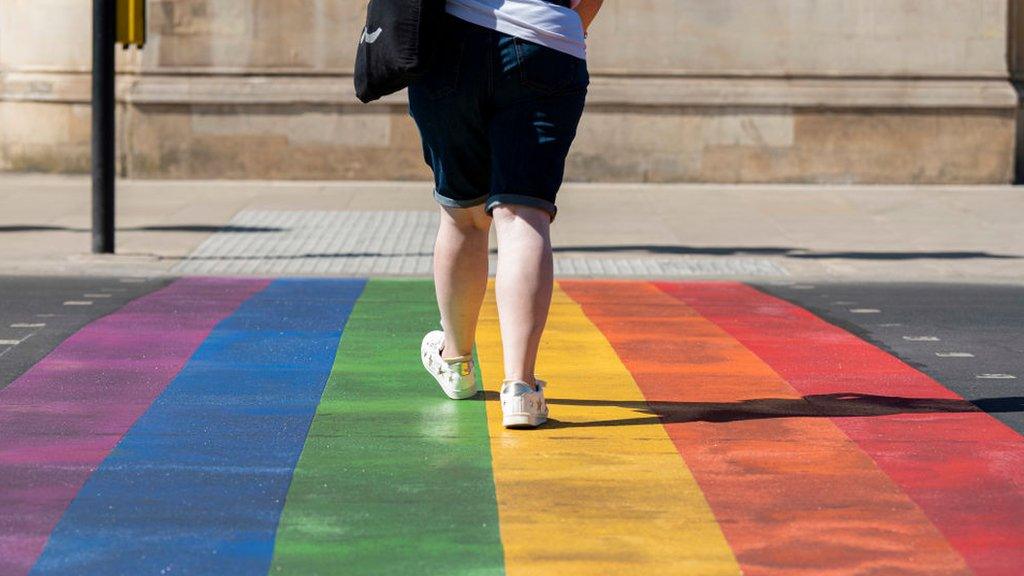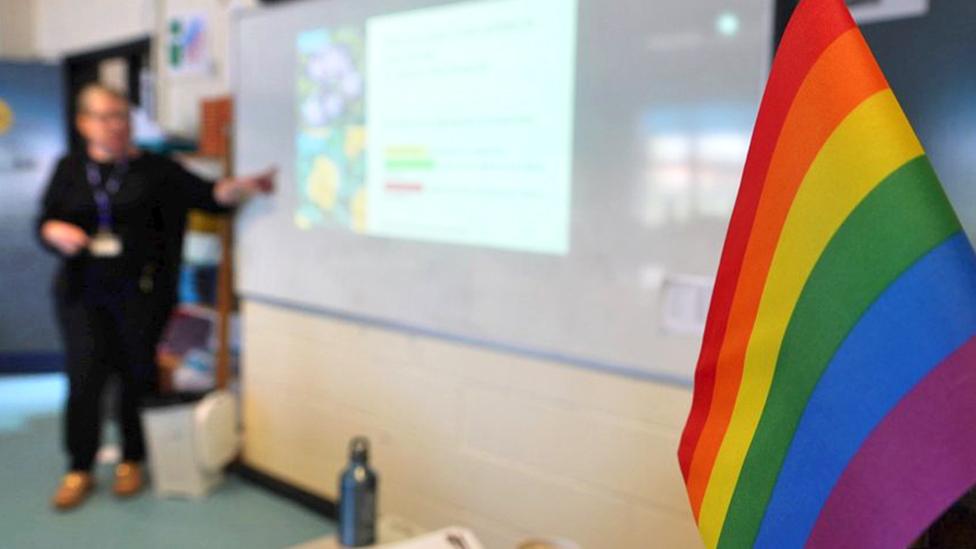Transgender guidance: Schools to keep parents informed
- Published

Teachers should inform parents if their child wishes to change their gender identity at school, under newly published government guidance.
Schools in England should "take a very cautious approach" if pupils want to use a new name, pronouns or uniform.
Teachers will be able to withhold information if they believe a child could be put at "significant" risk.
The Department for Education (DfE) says it will assist teachers to act in the best interest of pupils.
The guidance, external, which applies to schools in England, has been promised since 2018.
Education Secretary Gillian Keegan said: "Parents' views must also be at the heart of all decisions made about their children."
Minister for Women and Equalities Kemi Badenoch added the guidance made clear "schools do not have to accept a child's request to socially transition" - a term referring to when someone wants to change their name, pronoun, or clothing to reflect their gender identity.
Teachers or pupils should not be pressured into using different pronouns, she said.
Teaching union the Association of School and College Leaders (ASCL) welcomed the guidance's publication, saying it would review it to ensure it was clear and deliverable.
Under the new guidance teachers do not have a "general duty" to allow pupils to socially transition and are urged to use caution, including "watchful waiting periods, and ensuring parents are fully consulted before any decision is taken".

Head teacher Kevin Sexton says everyone should feel safe and happy at school
Kevin Sexton, head teacher at Chesterfield High School in Liverpool, says the guidance is unlikely to change much about his current approach to transgender students.
"I'm going to do what I'd basically do now, which is to support the child, to work with the child to actually give them the confidence to tell their parents," he says.
"It's interesting to understand that the majority of the work we've done with parents has been asking them for support, not us having to tell them… sometimes the work with schools is about how they can actually access other support services."
The guidance emphasises that any changes should be carried out "sensitively, without implying contested views around gender identity are fact".
However, it does allow teachers to withhold information from parents in the "exceptionally rare" circumstances where they believe telling parents could put a child at "significant" risk of harm.
Teaching staff, pupils and parents will also be told they do not have to observe a child's chosen name and pronouns if they "hold protected religious or other beliefs that conflict with the decision".
The guidance also says toilets, changing rooms and some sports should be separated based on a child's birth sex.
"Schools must not allow a child, aged 11 years or older, to change or wash in front of a child of the opposite sex," the guidance says.
As well as single-sex toilets for pupils aged eight and over, schools are advised that any gender-neutral facilities they may have should have floor-to-ceiling lockable doors or be fully contained in their own room.
The guidance also:
Reaffirms single-sex schools' right to refuse to admit pupils of the opposite sex, even if they are questioning their gender
Says primary school aged children (aged 11 and under) should not have different pronouns to their sex
Encourages schools to hold gender-questioning children to "the same uniform standard as other children of their sex"
Requires schools to record the name and biological sex of every pupil in the admissions register
Listen to 5 Questions On: Gender Identity in Schools
Earlier this year the government broke its own deadline for releasing the proposals after legal advice suggested its original plans to ban children from socially transitioning at school would be unlawful without introducing new legislation.
The guidelines will now be subject to a 12-week public consultation before being finalised; with teachers, parents and interested groups invited to give their views.
Some teachers have told the BBC they are relieved the guidance has been published, because they say some schools have faced difficult situations navigating the issue.
But others have anonymously said they intend to continue following their own policies regardless.
One teacher, who did not want to be identified, said this new guidance could "complicate school life even further" and "provides little assurance" for children who identify as transgender or non-binary.
Another said they wouldn't "out" a child against their wishes but would always encourage them to speak to their parents.
An independent interim report commissioned, external by NHS England into gender identity services for children and young people said more information was needed about social transitioning.
One parent told BBC News she was "completely horrified" when she found out her daughter had been using a different name and pronouns at school without her knowledge.
"At no point did they tell me what was actually going on," she said.
"They actively hid it from me for about four months, despite me being in touch with the school and expressing concerns about my daughter's wellbeing."
But Mike, who supported his son's new identity after he told him he was transgender at the age of 12, believes the new guidelines could put "a massive amount of undue pressure" on teachers.
"There should be some support services in place to which a school can signpost a young person where they'll get proper, professional counselling not biased in one direction or another."
Former Tory Prime Minister Liz Truss, who previously presented a Private Member's Bill calling for social transitioning not to be recognised by schools for under-18s, said the guidance provided "insufficient protection and clarity".
Advocacy group Sex Matters, which has lobbied the government on gender identity in schools, said the guidance contains "important positive steps" but left too much to the discretion of individual schools.
The guidance has been criticised by transgender youth support charity Mermaids, which said the proposed measures were "unworkable, out of touch and absurd".
In a statement, it said: "Rather than listening to trans young people and reflecting best practice of inclusive educators across the UK, the government has created more confusion for schools and is putting young people at risk."

Tanya Carter, of Safe Schools Alliance, disagrees with schools allowing pupils to socially transition
Tanya Carter, from the Safe Schools Alliance organisation, which is concerned about how some schools manage gender identity, says: "It's about safeguarding young people, and teachers should always speak to parents.
"They should show professional curiosity and questions should be asked, exploring why a child feels the way they do.
"When it comes to sports, it's not only about safety, it's about fairness to all pupils."
Caleb, 21, came out as transgender at the age of 16, but says that due to a lack of official guidance, teachers didn't know what to do.
He says compelling teachers to immediately tell parents their child is questioning their gender or wants to socially transition is "dangerous territory" if a parent is unsupportive.

Caleb came out as transgender aged 16, but says teachers didn't know how to support him
"If schools have a knowledge that a parent is not supportive, they're not safeguarding that child, they're sending them home to a completely unsafe environment."
Caleb was referred to gender identity services four years ago and is still awaiting a first appointment.
He added: "Social transition is important because it is the only thing transgender people can do to live their life the way they want to if they don't have the money to access private medical treatment as waiting lists on the NHS are so long."
What's the guidance in other nations?
The new Gender Questioning Guidance only applies to schools in England, as other nations have devolved education systems.
Northern Ireland's Education Authority published non-statutory guidance in 2019, covering things like name changes, uniforms, and facilities.
Unlike the English guidance, which advises parents should be told except in "exceptionally rare circumstances", the Northern Ireland document says teachers are advised to inform a pupil's parents where a young person is identifying as transgender - but only with the consent and knowledge of the pupil.
Scotland released non-prescriptive guidance in 2021 containing "real-life examples" of issues known to affect transgender students, including bullying, safety and privacy.
The Welsh government has not yet published guidance for schools on this matter, but a spokesperson said they are developing guidance at the moment to "support teachers and ensure trans children and young people are fully included in education.
"There needs to be extensive consultation with teachers, experts and the public, as well as children and young people themselves, so we will hold a full public consultation on the draft guidance in early 2024."
Additional reporting by Marthe de Ferrer and Kristian Johnson.

Are you personally affected by the issues raised in this story? Share your experiences by emailing haveyoursay@bbc.co.uk, external.
Please include a contact number if you are willing to speak to a BBC journalist. You can also get in touch in the following ways:
WhatsApp: +44 7756 165803
Tweet: @BBC_HaveYourSay, external
Please read our terms & conditions and privacy policy
If you are reading this page and can't see the form you will need to visit the mobile version of the BBC website to submit your question or comment or you can email us at HaveYourSay@bbc.co.uk, external. Please include your name, age and location with any submission.
- Published16 May 2024

- Published13 September 2023

- Published19 May 2023
